Porter, Turnbull, Cosgrove: averting constitutional crisis
Critical interventions during those days of madness cruelled a PM’s hopes of survival.
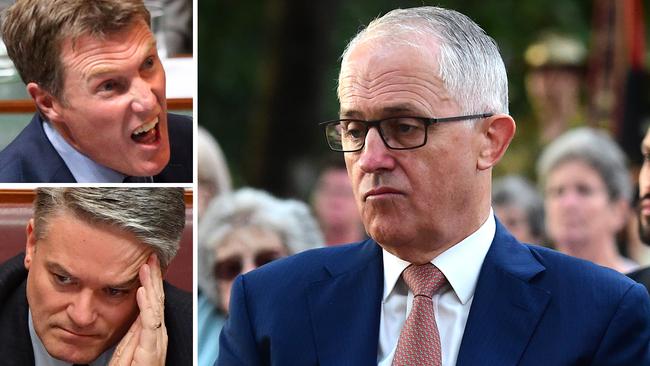
As soon as he heard prime minister Malcolm Turnbull declare his position vacant at the Liberal Party meeting on Tuesday, August 21 last year, a stunned and angry Mathias Cormann leaned across one friend, Andrew Hastie, and said to his very good mate Christian Porter: “This is f..king crazy.”
When they dined together that night at Belluci’s restaurant in Manuka, Porter and Cormann agreed the 35 votes for their other very good friend, Peter Dutton, meant Turnbull’s prime ministership was finished. They agreed they would probably have to tell Turnbull he should resign and hand over to Dutton. This was despite Cormann swearing black and blue to people as recently as the previous day that he would stick with Turnbull until the bitter end, had even discussed it with his wife, who agreed with him, and told other close friends previously he would go down with the ship.
Porter, as the Attorney-General, and despite his close friendships with Cormann and Dutton, sought to separate his political self from his legal self when Dutton’s eligibility to sit in parliament erupted as an issue. He wanted to ensure the process was as fair as he could make it.
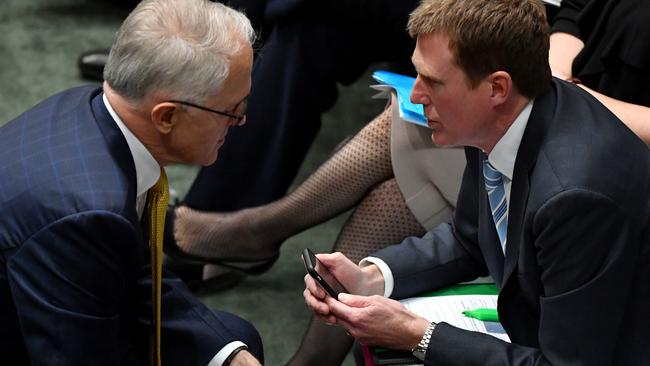
Intervening in madness
Critical interventions by Porter during those days of madness helped cruel Turnbull’s hopes of surviving until the end of that week and possibly racing off to an election. As I recount in my book Plots and Prayers, to be published on Monday, the week was marked by high-stakes meetings and phone calls, leading Porter to write to Solicitor-General Stephen Donaghue QC, instructing him neither to speak nor to offer advice to anyone other than himself, including the prime minister.
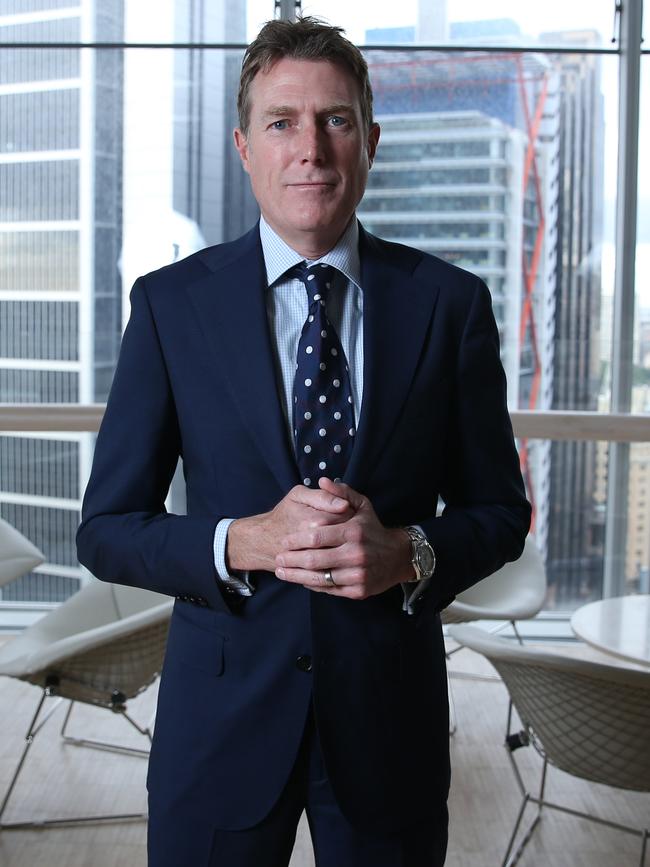
Porter emailed the Governor-General, offering to provide any advice he needed on what was required to commission a prime minister. After consulting his department, Porter was convinced the Governor-General would only be concerned to see the prime minister could guarantee confidence and supply.
At one meeting on Wednesday, August 22, Porter told Turnbull he should resign — advice not welcomed by the prime minister — and the following day offered his own resignation, which was not accepted by Turnbull, who referred to Porter as “my learned friend”. It was not a term of endearment.
Yet even as Porter thought the matter had been settled, after a number of tense meetings and accusations of being weak against terrorism, which apparently ended in a retreat by Turnbull, it transpired the prime minister’s official car, C-1, and his close personal protection were on standby to take him to Yarralumla to visit the Governor-General.
TOMORROW: In The Weekend Australian — Exclusive extracts from Niki Savva’s book: Who Malcolm Turnbull really blames for his demise.
Turnbull’s suspicions
Turnbull, concerned Dutton might be in breach of section 44 (v) of the Constitution over his wife’s childcare business receiving a government subsidy, had been threatening to tell Sir Peter Cosgrove not to commission him if he won the leadership vote — action that would have triggered a constitutional crisis rivalling that of 1975. Back then, governor-general Sir John Kerr had sacked a Labor government and a Labor prime minister at the urging of the Liberal leader. Turnbull was seeking to have his own government sacked.
Turnbull believed Porter was too close to Dutton and that this was influencing his judgment. The prime minister had formed the conclusion, from which he has never wavered, that Dutton was ineligible. He believed the advice from the Solicitor-General was wrong, and that it was similar to the advice he had given regarding Barnaby Joyce’s eligibility, which also turned out to be wrong after the High Court found Joyce’s dual citizenship rendered him ineligible to sit in parliament.
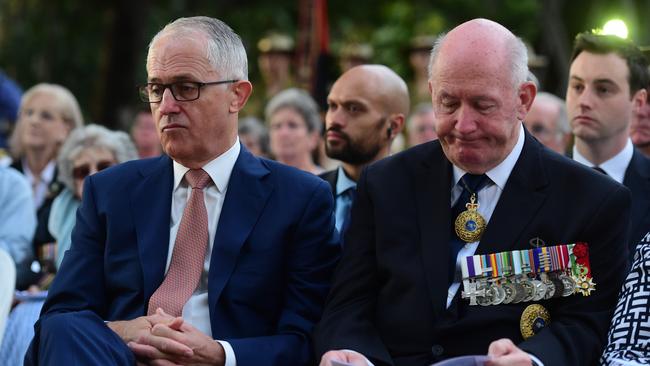
Turnbull was fully prepared, as the outgoing prime minister, to formally write to the Governor-General to advise him that Dutton should not be sworn in. As he fought to hold on to his job, Turnbull told colleagues that Cosgrove would not commission Dutton, threatening to get him on the phone then and there to discuss it. When it was over, after he had calmed down a bit, he would acknowledge he did not know what the Governor-General would have done, but remained firm in his opinion that the doubts surrounding Dutton’s eligibility were both real and relevant.
During one tense meeting, Porter recalls Turnbull saying to him: “You’re giving in to terrorists.” Porter says he was outraged. “I think I said to him: ‘I’ve worked my whole life to be in this parliament. Nothing means more to me. I’ve served you in a very hardworking, loyal way,’ ” Porter recounts.
What’s done is done
“I’ve had nothing to do with this, but what’s now done can’t be undone, and I’m just offering you my honest assessment — the position’s untenable. I said to him, ‘I’ve got a father going through chemo back in Perth. I’ve got a 3.6 per cent seat where I’m constantly out in every spare moment I have, when I’m not working hard as a cabinet minister, going to the opening of every cake stall known to man, and none of this helps me, and I wish it never would have happened, and it has happened.’
“And he said words that I won’t long forget. He said, ‘Well, it’s happened because you and people like you are weak, and you’ve given in to terrorists.’ And I said, ‘Well, I won’t be staying here to have you call me weak.’
“At the end of that meeting … I reiterated that I thought that it would be utterly wrong at law to suggest or provide advice to the Governor-General that he couldn’t appoint Peter if Peter emerged victorious from the partyroom, because that would be evidence of confidence and supply.
“And Malcolm was quite close to me when he sort of leaned to me and said, ‘Well, my learned friend, you’d be quite wrong.’ ”
Porter stayed glued to his television, waiting to see what Turnbull would say at his press conference. Turnbull had not been bluffing Porter but he nonetheless thought better of it and pulled back at his press conference while still doing his best to cast doubt on Dutton’s eligibility. Turnbull said the Solicitor-General would advise whether Dutton was eligible in time for a party meeting the next day. He also declared that if the spill motion was passed, he would not renominate for the leadership — thereby formally, openly clearing the way for Scott Morrison and Julie Bishop to run.
-
‘He (Turnbull) said words that I won’t long forget. He said, “Well, it’s happened because you and people like you are weak, and you’ve given in to terrorists.” And I said, “Well, I won’t be staying here to have you call me weak.”
‘At the end of that meeting … I reiterated that I thought that it would be utterly wrong at law to suggest or provide advice to the Governor-General that he couldn’t appoint Peter if Peter emerged victorious from the party¬room, because that would be evidence of confidence and supply.
‘And Malcolm was quite close to me when he sort of leaned to me and said, “Well, my learned friend, you’d be quite wrong”.’
— Christian Porter
-
PM’s escape hatch
Turnbull had made the wrenching decision to remove himself, doing his best to protect his legacy with as graceful an exit as possible from the job he had coveted for most of his life. Except, as Christopher Pyne was to discover on Thursday afternoon, he had an escape hatch — cars and cops at the ready to take him to the Governor-General to dissolve parliament, even after he had said he would not run if the spill vote in the partyroom the next day went against him.
Pyne said Turnbull wanted to keep all options open.
Turnbull was prepared for anything and everything. He was convinced that if Dutton won the ballot, he would not win a vote of confidence in the house.
Pyne, usually not known for understatements, later observed: “There was a lot of nonsense going on. He wanted to keep all his options open.”
In Simon Birmingham’s view, it was untenable to call an election in the middle of such mayhem. “You can’t call an election against your own side,” Birmingham said later.
After Porter left one meeting, Turnbull was fuming, and then suspicious, asking those around him, including Craig Laundy, if they thought Porter had crossed to Dutton. Turnbull knew Porter was close to Dutton and was concerned this might be influencing his opinion about whether Dutton had a case to answer.
Laundy was convinced that Porter would play a straight bat, if for no other reason than to protect his integrity.
In his view, someone with higher ambitions such as Porter would not want such a blot on his record. Turnbull’s dry, rhetorical question to Laundy was simply: “Didn’t you say the same thing about Mathias Cormann?”
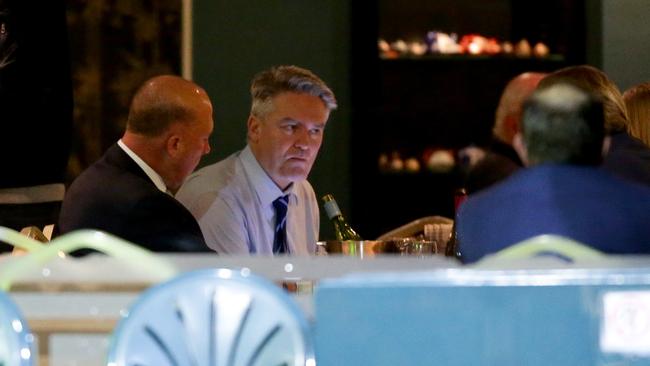
Porter spent Thursday preparing answers to possible questions from MPs in the partyroom about the Governor-General and the commissioning of a new leader. His normally orderly office was stacked high with books and notes when another very good friend, Michael Keenan, dropped by.
“I am literally rereading every piece of constitutional law text I can get my hands on about s. 44 and s. 44(v). Keenan comes into the room and says, ‘Mate, do you want to come out for dinner?’ ” Porter recalls.
“I said, ‘Mate, are you f..king kidding?’ He goes, ‘Aw, are you doing the s. 44 stuff?’
“As it transpires, that was him and (Steve) Ciobo out at wherever, the Ottoman, drinking champagne cocktails.”
Porter was glad he missed it. Keenan’s advice to his good friend Porter was to make sure he was “on the right side of this thing”.
Still, even on the Friday, when it came time to vote, Porter swore in a long interview with me for the book that he voted against the spill motion — which Turnbull narrowly lost — then voted for Dutton in both subsequent ballots.
Tension at DEFCON
In their meetings, Porter says he resisted the temptation to bite back against a man fighting for his life. “I felt like saying: Mate, they’re doing to you what you did to them. Like, have some perspective on it. But I … at that point it wasn’t worth being combative — it would have just been gratuitous … I just understand the agony and pressure he was under.
“I’m not angry at Malcolm. And I’d said to him that if I was, you know, not prepared to resign, he’d always have my support.
“Like, I’ve spent my life as a lawyer. Somehow or other, I ended up being the commonwealth Attorney-General, and I’m facing down a potential constitutional crisis. Ultimately, one that got to DEFCON 4, and then all the army stood down.
“But, you know, there was a significant likelihood that you might have had Peter Dutton win a ballot in the partyroom and someone argue to the Attorney-General — to the Governor-General — that he shouldn’t appoint Peter as prime minister, and then Australia wouldn’t have had a prime minister.
“Some time after that, I relayed the conversation to Mathias.
“I said that my view after that meeting had formed that I — if I’d had a view that it would be the right thing to offer a resignation — that I wasn’t going to do that again, because it hadn’t been accepted and I wasn’t going to do that again, because I had a very firm view after that meeting that the best thing I could do was ensure that Australia had an Attorney-General through this process.
“Because I thought that if Australia didn’t have an Attorney-General through the process, that it was likely that someone would be acting in the role of Attorney-General, and that the process would not be as fair as it could be.”


To join the conversation, please log in. Don't have an account? Register
Join the conversation, you are commenting as Logout